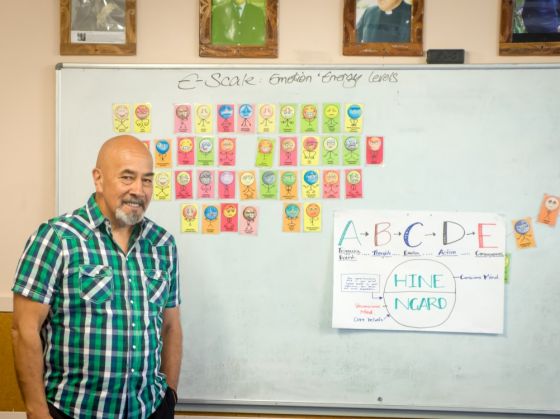Enhancements to Mauri Tū Pae Programme
20 November 2020
Men who complete the Mauri Tū Pae programme will now take part in a purpose designed maintenance programme, rather than the general maintenance programme previously available. The change, which came into effect at the start of October, is part of the Māori Pathways programme.
Mauri Tū Pae is an offence focused group rehabilitation programme which is underpinned by a Māori-centred framework to better meet the needs of Māori men in our care. The programme is delivered in Te Tirohanga units and Northland Region Corrections Facility (NRCF).
Jessica Borg, GM Psychology and Programmes (Acting) says the change to the maintenance programme will enable providers to better reinforce what the men have learnt and support the application of programme skills to their everyday lives.
“The programme was co-designed by the Mauri Tū Pae providers and Medium Intensity Programmes Team at National Office. With the new maintenance arrangement, Mauri Tū Pae facilitators will continue to connect with the men upon release to the community for the first time.
“We know it will make a big difference to the men and their whānau,” she says.

Mauri Tū Pae – incorporating te ao Māori worldview
In te reo Māori ‘au’ means ‘I’ or ‘me’. A relationship model taught as part of the Mauri Tū Pae programme is called the ‘Au Circle’
“That’s au whānau, whanaungatanga, whakawhanaungatanga. In every one of those words is au,” explains long-time Mauri Tū Pae provider Don Hutana.
Don tells a story from a recent Mauri Tū Pae graduation at Hawke’s Bay Regional Prison.
“This guy told us when he first came on the programme his goal was to be the baddest gangster on the planet.
“We get them to present what they've learned at the graduation day and their whānau attend. As he presented on the ‘Au Circle’, he was holding his one-year-old baby. He looked at the baby’s mother and he said to the whole group, ‘this is what it’s about right here,’ and then he kissed the baby.”
Don has been involved in Mauri Tū Pae and its predecessor since 1997.
“I started doing this kind of work voluntarily. Then I was asked if ‘d be able to write a Māori therapeutic program which I did and called Whakamoe Patu.
“About 12 years ago the number of providers had grown to six – doing similar programmes but supported by their own hapū and iwi kaupapa. We were invited down to Wellington because we were all getting pretty good results, and head office staff wanted to know what we were doing!
“Then Arrin Clark from Te Tai Tokerau, Hinewirangi Kohu and I rewrote the program. We named it Mauri Tū Pae because we wanted to work on the mauri of the men.”
Mauri Tū Pae focusses as much on healing as it does on rehabilitation and as the manual says ‘tū mauri’ entails the restoration of one’s mauri; ‘pae’ is about being set in order, or in its proper place which involves a sense of longevity. The word ‘pae’ as in pae tapu connects us with the spiritual realm.
Don says the Cognitive Behavioural Therapy concepts are similar in Mauri Tū Pae as in standard Medium Intensity Rehabilitative Programmes (MIRP) but the approach differs.
“We develop a great rapport with the men. We know their world; we know their language. If you don’t know their worldview you won't get any rapport with them.
“When we talk about the triggers, the actions, the consequences - we use language and scenarios familiar to us all. The conversations draw heavily on kaupapa and tikanga Māori like karakia, mōteatea, whakapapa, kōrero pūrākau and whakataukī.”
He points to the Mana Tamariki, Mana Tāne, Mana Wāhine module at Rimutaka last year run by Waylyn’s company Te Koru and his Amokura Enterprises.
“We asked the men to put an empty chair next to them and invite the person who would be most likely to support them when they come out of jail to sit there. They didn’t have to be alive. Nine out of 10 of them chose women – their partners, mother or their kuia.
“We asked them to introduce them and to tell us what their values were. The emotion in the room at the end was just unreal. Then I recited the words of the haka, ‘Tika Tōnu’, as a challenge and support for them to commit themselves the values of the person. It’s a really powerful way to finish that module.”

